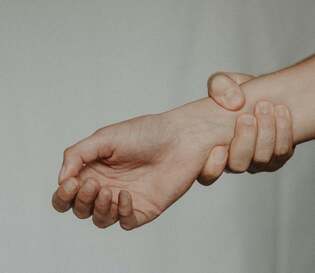|
What is a wrist sprain? Wrist sprains are a general term used to describe any injury to the wrist that doesn’t include a fracture, but is most likely to be a ligament injury. While this can indicate that they are not serious injuries, wrist sprains can be complicated injuries that require supervision and treatment to recover fully. The wrist refers to the area where the bones of the forearm, the radius and ulna, meet and join the bones of the hand. The wrist is able to twist on itself and allows the hand to move to face palm up (supination) or palm down (pronation). The hand is also able to move up and down (flexion/extension) and side to side (abduction/adduction). To allow such complicated movements, the joint surfaces of the wrist are held together by a series of ligaments. When a wrist is sprained, it is usually these ligaments that have been damaged. What are the symptoms?
The primary symptom of a sprained wrist is pain with movement of the joint or when taking load, such as when holding a heavy object. Ligament injuries are given a grading scale to indicate their severity, which can help to guide treatment. Grade 1 refers to a stretching or laxity of the ligament fibres and injuries of this grade usually heal with rest within 2-3 weeks. A grade 2 classification signifies that there has been a partial tear of the ligament fibres and will often need more time and treatment for recovery. Grade 3 tears refer to a full thickness rupture of a ligament and may require splinting or even surgery. The most common cause of a wrist sprain is a fall onto an outstretched hand. Ligament injuries can also happen gradually through over use, although this is less common. What is the treatment? Your physiotherapist is able to help diagnosis a wrist sprain and can help to rule out a fracture. An X-ray might be required and your physiotherapist will perform special tests to help identify exactly which structure has been injured, also giving the injury a grade, to help guide treatment. How can physio help? The key to effective recovery for a wrist sprain is ensuring that the right treatment protocols are in place for your particular injury. Grade 1 sprains will recover best with gentle exercises and early strengthening while Grade 2 to 3 injuries may require splinting or even a surgical consultation for repair. If surgery is the right course for you, your physiotherapist is able to guide you through this treatment pathway, helping you to prepare and recover from surgery to get the best outcome possible.
1 Comment
|
Categories
All
|


